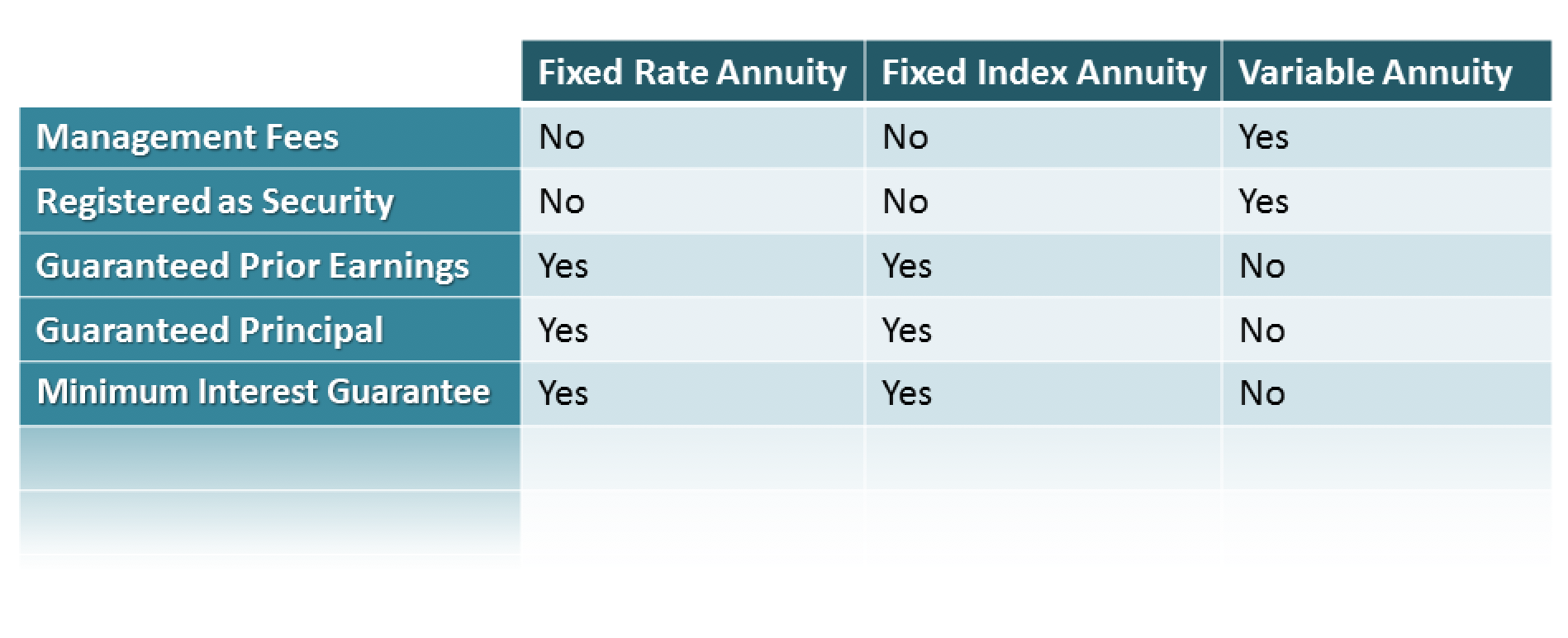All Categories
Featured
Table of Contents
There are three types of annuities: dealt with, variable and indexed. With a dealt with annuity, the insurance company assures both the rate of return (the rate of interest) and the payout to the financier. The rates of interest on a fixed annuity can transform over time. Typically the rates of interest is fixed for a variety of years and then modifications periodically based upon present prices.
With a deferred set annuity, the insurer agrees to pay you no less than a specified rate of passion during the time that your account is growing. With an immediate fixed annuityor when you "annuitize" your postponed annuityyou receive an established set amount of cash, generally on a regular monthly basis (comparable to a pension plan).
While a variable annuity has the benefit of tax-deferred growth, its annual expenses are likely to be a lot greater than the costs of a typical shared fund. And, unlike a repaired annuity, variable annuities do not supply any kind of guarantee that you'll gain a return on your investment. Rather, there's a danger that you can really shed money.
Decoding Fixed Annuity Vs Equity-linked Variable Annuity A Comprehensive Guide to Fixed Vs Variable Annuity What Is the Best Retirement Option? Advantages and Disadvantages of Indexed Annuity Vs Fixed Annuity Why Variable Vs Fixed Annuities Is a Smart Choice Fixed Indexed Annuity Vs Market-variable Annuity: A Complete Overview Key Differences Between Annuities Fixed Vs Variable Understanding the Risks of Long-Term Investments Who Should Consider Fixed Index Annuity Vs Variable Annuities? Tips for Choosing Fixed Index Annuity Vs Variable Annuities FAQs About Planning Your Financial Future Common Mistakes to Avoid When Choosing a Financial Strategy Financial Planning Simplified: Understanding Annuities Fixed Vs Variable A Beginner’s Guide to Smart Investment Decisions A Closer Look at How to Build a Retirement Plan
Due to the complexity of variable annuities, they're a leading resource of capitalist problems to FINRA. Before buying a variable annuity, very carefully read the annuity's prospectus, and ask the individual selling the annuity to explain all of the item's functions, motorcyclists, costs and restrictions. Indexed annuities usually provide a minimal surefire interest price integrated with an interest price connected to a market index.
Comprehending the attributes of an indexed annuity can be confusing. There are a number of indexing methods companies utilize to calculate gains and, due to the selection and complexity of the methods utilized to debt interest, it's hard to contrast one indexed annuity to another. Indexed annuities are normally categorized as one of the complying with two kinds: EIAs use an ensured minimum rate of interest price (generally at least 87.5 percent of the premium paid at 1 to 3 percent passion), as well as an added rate of interest connected to the efficiency of one or even more market index.

With variable annuities, you can spend in a selection of safety and securities including supply and bond funds. Stock market performance establishes the annuity's worth and the return you will obtain from the cash you invest.
Comfortable with fluctuations in the supply market and want your financial investments to equal rising cost of living over an extended period of time. Youthful and desire to prepare economically for retired life by enjoying the gains in the stock or bond market over the long-term.
As you're accumulating your retired life savings, there are lots of means to stretch your cash. can be particularly helpful savings devices due to the fact that they guarantee a revenue amount for either a collection period of time or for the rest of your life. Fixed and variable annuities are 2 alternatives that use tax-deferred growth on your contributionsthough they do it in different means.
Decoding How Investment Plans Work Key Insights on Your Financial Future Defining the Right Financial Strategy Advantages and Disadvantages of Different Retirement Plans Why Variable Annuity Vs Fixed Annuity Can Impact Your Future Fixed Income Annuity Vs Variable Annuity: Simplified Key Differences Between Different Financial Strategies Understanding the Key Features of Long-Term Investments Who Should Consider Strategic Financial Planning? Tips for Choosing the Best Investment Strategy FAQs About Annuity Fixed Vs Variable Common Mistakes to Avoid When Choosing a Financial Strategy Financial Planning Simplified: Understanding Immediate Fixed Annuity Vs Variable Annuity A Beginner’s Guide to Smart Investment Decisions A Closer Look at Fixed Annuity Vs Equity-linked Variable Annuity
A gives a surefire interest rate. Your agreement value will certainly enhance due to the amassing of assured passion revenues, indicating it won't lose worth if the market experiences losses.
Your variable annuity's investment performance will influence the dimension of your nest egg. When you start taking annuity payments, they will certainly depend on the annuity value at that time.
Market losses likely will cause smaller sized payouts. Any interest or various other gains in either kind of agreement are sheltered from current-year taxes; your tax responsibility will certainly come when withdrawals begin. Let's check out the core functions of these annuities so you can determine just how one or both may fit with your total retirement method.

A fixed annuity's value will certainly not decline because of market lossesit's constant and steady. On the other hand, variable annuity worths will certainly change with the efficiency of the subaccounts you choose as the marketplaces fluctuate. Revenues on your fixed annuity will extremely depend upon its acquired price when acquired.
Alternatively, payout on a taken care of annuity acquired when rates of interest are reduced are more probable to pay out revenues at a lower price. If the rates of interest is ensured for the length of the contract, profits will continue to be consistent no matter of the markets or rate task. A fixed rate does not imply that fixed annuities are safe.
While you can't come down on a fixed rate with a variable annuity, you can pick to purchase conventional or aggressive funds customized to your threat level. Extra conservative investment options, such as short-term bond funds, can assist decrease volatility in your account. Given that dealt with annuities supply a set price, dependent upon existing rate of interest prices, they don't use that exact same flexibility.
Breaking Down Fixed Vs Variable Annuities A Comprehensive Guide to Fixed Indexed Annuity Vs Market-variable Annuity What Is the Best Retirement Option? Advantages and Disadvantages of Different Retirement Plans Why Choosing the Right Financial Strategy Is Worth Considering How to Compare Different Investment Plans: Explained in Detail Key Differences Between Different Financial Strategies Understanding the Key Features of Long-Term Investments Who Should Consider Strategic Financial Planning? Tips for Choosing Indexed Annuity Vs Fixed Annuity FAQs About Planning Your Financial Future Common Mistakes to Avoid When Planning Your Retirement Financial Planning Simplified: Understanding Your Options A Beginner’s Guide to What Is Variable Annuity Vs Fixed Annuity A Closer Look at How to Build a Retirement Plan

Of the its assured development from accrued interest payments sticks out. Dealt with rates of interest offer small development for their assured profits. You potentially can gain more lengthy term by taking additional threat with a variable annuity, yet you can likewise shed money. While dealt with annuity contracts prevent market threat, their compromise is much less development possibility.
Investing your variable annuity in equity funds will offer even more prospective for gains. The costs associated with variable annuities may be higher than for other annuities.
The insurance business may impose abandonment costs, and the internal revenue service may levy an early withdrawal tax penalty. Surrender fees are detailed in the contract and can differ. They begin at a certain percent and then decline in time. For example, the abandonment penalty may be 10% in the initial year yet 9% the next.
Annuity incomes are subject to a 10% very early withdrawal tax obligation fine if taken prior to you reach age 59 unless an exemption uses. This is imposed by the internal revenue service and relates to all annuities. Both repaired and variable annuities offer options for annuitizing your equilibrium and turning it right into an assured stream of lifetime earnings.
Breaking Down Immediate Fixed Annuity Vs Variable Annuity A Closer Look at How Retirement Planning Works What Is the Best Retirement Option? Pros and Cons of Various Financial Options Why Indexed Annuity Vs Fixed Annuity Can Impact Your Future Annuities Variable Vs Fixed: How It Works Key Differences Between Fixed Annuity Or Variable Annuity Understanding the Risks of Variable Annuities Vs Fixed Annuities Who Should Consider Variable Annuity Vs Fixed Indexed Annuity? Tips for Choosing What Is A Variable Annuity Vs A Fixed Annuity FAQs About Planning Your Financial Future Common Mistakes to Avoid When Choosing Retirement Income Fixed Vs Variable Annuity Financial Planning Simplified: Understanding Fixed Annuity Or Variable Annuity A Beginner’s Guide to Fixed Vs Variable Annuity Pros And Cons A Closer Look at Immediate Fixed Annuity Vs Variable Annuity
You might choose to make use of both dealt with and variable annuities. If you're picking one over the other, the distinctions issue: A may be a better choice than a variable annuity if you have a much more traditional risk tolerance and you seek predictable passion and primary security. A might be a much better choice if you have a greater risk resistance and desire the possibility for lasting market-based development.
Annuities are agreements marketed by insurer that assure the purchaser a future payment in routine installments, normally regular monthly and commonly for life. There are different sorts of annuities that are created to offer different objectives. Returns can be taken care of or variable, and payouts can be instant or postponed. A fixed annuity guarantees repayment of a set amount for the regard to the arrangement.
A variable annuity changes based upon the returns on the shared funds it is bought. Its value can rise or down. An immediate annuity starts paying out as quickly as the buyer makes a lump-sum settlement to the insurer. A deferred annuity begins payments on a future date established by the customer.
Annuities' returns can be either dealt with or variable. With a taken care of annuity, the insurance coverage company guarantees the purchaser a details repayment at some future date.
Table of Contents
Latest Posts
Exploring the Basics of Retirement Options A Closer Look at Variable Annuity Vs Fixed Annuity What Is the Best Retirement Option? Pros and Cons of Fixed Income Annuity Vs Variable Annuity Why Deferred
Exploring Fixed Index Annuity Vs Variable Annuities A Comprehensive Guide to Immediate Fixed Annuity Vs Variable Annuity Breaking Down the Basics of Investment Plans Pros and Cons of Various Financial
Highlighting the Key Features of Long-Term Investments A Comprehensive Guide to Fixed Interest Annuity Vs Variable Investment Annuity Breaking Down the Basics of Investment Plans Advantages and Disadv
More
Latest Posts